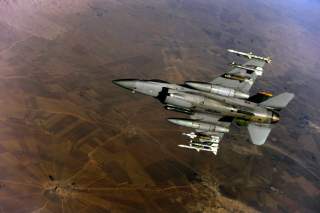A Five-Step Plan to Destroy the Islamic State
Defeating IS would involve a long-term, comprehensive strategy. Here is how to do it.
In Iraq, this means working simultaneously with the Iraqi government, the Kurdish regional government, and friendly Sunni forces to develop and execute a campaign plan against IS. The Kurds should be provided with heavy weapons and materiel and supported by U.S. special forces and air strikes to liberate IS-controlled areas from the north. Similar support should go to Iraqi Security Forces and friendly Sunni tribes in a concerted effort to take control of western Iraq. As territory is taken, it is essential that governance and services be put in place to consolidate gains and win the political competition against IS.
Increased U.S. support for the national Syrian opposition and timely military strikes against IS targets in Syria are necessary both to put pressure on IS across all the territory it controls and to lay the groundwork for a political settlement. While the Obama administration has proposed a $500 million program for nationalist forces fighting IS, delays in the provision of this assistance are working to the advantage of IS, which is seizing ground from moderate Syrians. Given the slow rate at which the proposal is moving through Congress, it may take another year before U.S. assistance makes a real impact on the ground in Syria. IS could take Syria’s largest city of Aleppo in the meantime. This program must be accelerated on an emergency basis.
Internationalize the Anti-IS Effort:
IS poses a security and economic threat to the international community. The more than one thousand Western citizens who have already joined IS could very well turn their attention toward their own countries. The threat from Islamic extremists to Russia and China would also increase, were IS to expand and gain more converts. And IS can disrupt energy supplies from Iraq, increasing oil prices around the world.
The UK, France and others are already providing assistance to the Kurds following recent U.S. strikes against IS. The United States could galvanize even more international action by publicly declaring that its objective is to defeat IS. Engagement at the presidential level would demonstrate U.S. resolve, and would ease negotiations with allies and partners on how they can support U.S. strategy. A presidential envoy, empowered by the White House to oversee the implementation and execution of this strategy, would facilitate unity of effort and shared goals between the military, intelligence community and diplomatic service, and coordinate humanitarian aid efforts between participating countries, international organizations and local communities.
Beyond Syria and Iraq, the Middle East as a whole is threatened by IS. Regional cooperation, in turn, can help in defeating IS. The United States should promote cooperation by Iran, Turkey and Saudi Arabia—behind a coordinated strategy to confront the IS challenge and stabilize Iraq and Syria. The establishment of a contact group offers a potentially useful vehicle through which regional actors could help temper the sectarian polarization that is fueling IS. As seen in Afghanistan, where Pakistan continues to fuel the Taliban threat, defeating IS will be difficult in the absence of regional cooperation.
In the less than thirty days that he has to form a new government, Abadi will need support from the United States, Iran, Turkey and major Arab states to negotiate a formula for power sharing. Agreement on reconciliation and power sharing in Iraq and Syria could facilitate greater cooperation from regional players in sharing the economic and military costs of dealing with the IS threat.
Prepare the American People for a Costly, Long-Term Mission:
Without a sustained effort by the Obama administration and congressional leaders to explain the stakes in the Middle East and prepare the American people for a long-term effort, the wars in Iraq and Syria could become a partisan issue in the 2016 presidential elections at precisely the time when the situation on the ground calls for an expanded U.S. presence. It is incumbent on the president to reach out to congressional leaders and the American people and explain the nature of the IS challenge, how it threatens America’s vital interests and why the United States must address it. With the U.S. population eager to wind down the “war on terror,” this will not be an easy conversation. Indeed, even a minor escalation in U.S. engagement will be difficult in the current war-weary political climate.
The lesson of the rise of the IS is that sustained U.S. engagement in the Middle East is essential to stability and progress. Many may wish to turn their backs on the region, but the costs of doing so have already proven higher than those of a smart engagement strategy. This lesson implies that we should keep a residual force in Afghanistan beyond 2016 and that shaping the region in positive ways will require presence and active management of partnerships across the region.
With respect to Iraq and Syria, a long-term strategy to defeat IS is preferable to containment or other alternatives. Similar to the approach that the United States took in 2001 during the early phase of the Afghanistan campaign, a military campaign relying principally on special forces and air strikes could create space for a major humanitarian effort in Iraq, favorable conditions for internal rebellions against IS, increased support to Syrian nationalists and intensified efforts to degrade IS’ predominantly local sources of financing. Demonstrable progress now would preclude the need for the deployment of combat ground forces, and would help the United States internationalize the mission and promote burden sharing over the long run.
Zalmay Khalilzad was the U.S. Ambassador to Afghanistan, Iraq and the UN.
Image: Flickr/Official U.S. Air Force/CC by-nc 2.0

